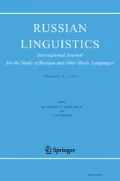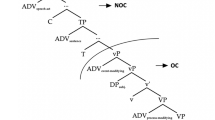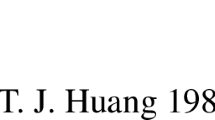Abstract
It has been acknowledged that the null subject of a converbial clause in Russian is canonically controlled by the Nominative subject of a main clause (that is, Nominative subject control). Non-Nominative control has been considered to be ungrammatical. On the basis of two experiments (an acceptability judgement task and speeded grammaticality judgement task), the paper shows that non-Nominative control with mental converbs is evaluated lower than grammatically correct, but higher than grammatically incorrect, sentences. Moreover, according to the data from the RNC, the frequency of non-Nominative control has been increased in more recent written texts (those written approximately after the 1950s). Furthermore, the paper reveals a new effect of the linear position of a converbial clause relative to a main clause (preposition vs. postposition). Preposed converbial clauses are judged to be more acceptable than postposed converbial clauses. In corpus texts that have been written more recently, there has also been a tendency for non-Nominative control to occur in sentences with preposed converbial clauses. Last but not least, the paper demonstrates that sentences with a 1SG pronoun are more acceptable than sentences without a 1SG pronoun.
Аннотация
Грамматически стандартной в русском языке является ситуация, при которой нулевое подлежащее деепричастной клаузы контролируется подлежащим главной клаузы в Именительном падеже (Номинативный субъектный контроль). Неноминативный контроль считается грамматически неправильным. На основании двух проведённых экспериментов, в которых использовались методика оценки приемлемости (‘acceptability judgement task’) и методика ускоренной оценки приемлемости (‘speeded grammaticality judgement task’), в статье демонстрируется, что предложения с неноминативным контролем, при котором подлежащее главной клаузы выражено предложной формой личного местоимения в Родительном падеже у меня, оцениваются хуже при деепричастиях ментальных глаголов, чем грамматически правильные предложения, но лучше, чем грамматически неправильные предложения. Кроме того, по данным Национального корпуса русского языка (НКРЯ), частотность неноминативного контроля существенно выше в новых письменных текстах (приблизительно со второй половины 20-го века). Далее, в статье выявлен новый эффект линейной позиции деепричастной клаузы относительно главной клаузы. Препозитивные деепричастные клаузы оцениваются как более приемлемые, чем постпозитивные клаузы. В новых письменных текстах НКРЯ неноминативный контроль—редкое явление, однако была замечена следующая тенденция: неноминативный контроль значительно чаще встречается в предложениях с препозитивными деепричастными клаузами, чем с постпозитивными. Наконец, в статье показано, что предложения с личным местоимением я более приемлемы, чем без этого местоимения.



Similar content being viewed by others
Notes
acc—Accusative, conv—converb, f—feminine, gen—Genitive, dat—Dative, inf—infinitive, inst—Instrumental, loc—Locative, m—masculine, nom—Nominative, part—participle, pl—plural, prep—prepositional, prs—present, pst—past, sg—singular. Examples without a source indicated are our own.
Bikkulova, O. S., Onipenko, N. K. Problema deepričastnoj normy i kategorija sub”ekta [talk given at the international scientific conference ‘Grammatičeskie processy i sistemy v sinxronii i diaxronii. Moskva, 30 maja–01 ijunja 2016 g.’].
Rožkova, A. Ju. Pričastija i deepričastija kak markery urovnja rečevoj kompetencii govorjaščego [unpublished materials]. Sankt-Peterburg 2011.
A list of the stimuli used in the first experiment can be accessed at https://zevakhina.github.io/experiment-position.html.
References
Apresjan, Ju. D. (1995). Integral’noe opisanie jazyka i sistemnaja leksikografija. Moskva.
Babenko, L. (1999). Tolkovyj slovar’ russkix glagolov. Ideografičeskoe opisanie. Moskva.
Čupaševa, O. M. (2010). Grammatika russkogo deepričastija (Avtoreferat na soiskanie učenoj stepeni doktora filologičeskix nauk). Moskva.
Glovinskaja, M. Ja. (1996). Aktivnye processy v grammatike (na materiale innovacij i massovyx jazykovyx ošibok). In E. A. Zemskaja (Ed.), Russkij jazyk konca XX stoletija (pp. 237–304). Moskva.
Haspelmath, M., & König, E. (Eds.) (1995). Converbs in cross-linguistic perspective (Empirical Approaches to Language Typology, 13). Berlin, New York.
Ickovič, V. A. (1982). Očerki sintaksičeskoj normy. Moskva.
Ljaševskaja, O. N., & Šarov, S. A. (2009). Novyj častotnyj slovar’ russkoj leksiki. Moskva. Retrieved from http://dict.ruslang.ru/freq.php (6 May 2020).
Plado, H. (2015). The subject of the Estonian des-converb. SKY Journal of Linguistics, 28, 313–348.
RAG-80: Švedova, N. (Ed.) (1980). Russkaja grammatika. Moskva.
Yokoyama, O. (1983). Advocating prohibited converbs. In American contributions to the IXth International congress of slavists. Vol. 1 (pp. 373–381). Los Angeles.
Xrakovskij, V. S. (Ed.) (2009). Tipologija taksisnyx konstrukcij. Moskva.
Author information
Authors and Affiliations
Corresponding author
Additional information
Publisher’s Note
Springer Nature remains neutral with regard to jurisdictional claims in published maps and institutional affiliations.
The study was supported by the Russian Science Foundation, grant No. 18-78-10128. The authors express their sincere gratitude to Nikita Murav’ev and to the audiences of the conferences Formal Approaches to Slavic Linguistics 28 and Syntax of the World’s Languages 8 for all the valuable comments and suggestions.
Rights and permissions
About this article
Cite this article
Zhukova, S., Zevakhina, N., Slioussar, N. et al. Non-canonical control in Russian converbial clauses. Russ Linguist 44, 129–143 (2020). https://doi.org/10.1007/s11185-020-09229-8
Published:
Issue Date:
DOI: https://doi.org/10.1007/s11185-020-09229-8




